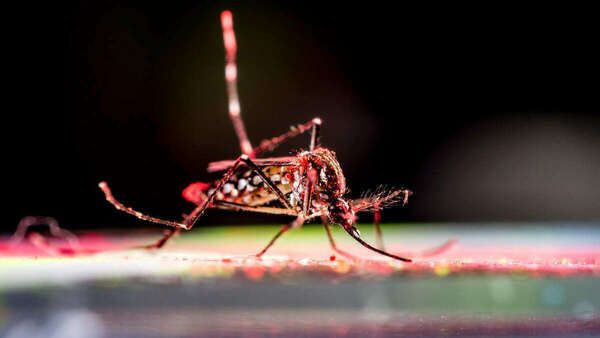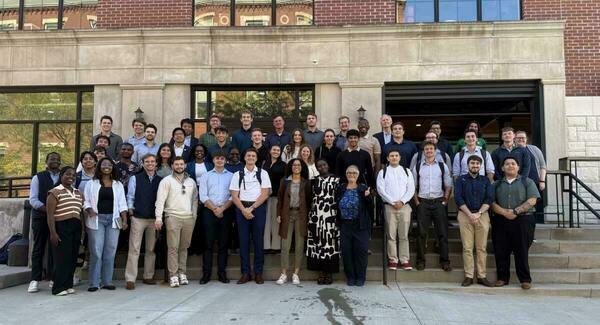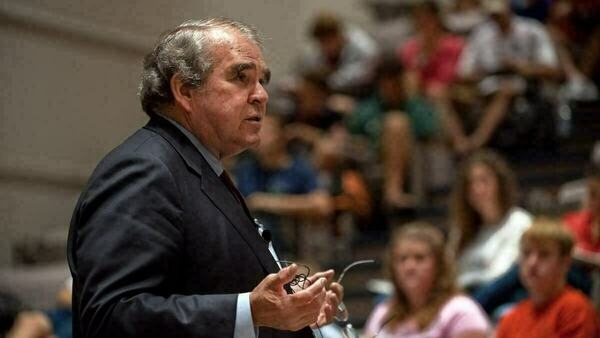Notre Dame’s R.I.S.E. AI Conference builds interdisciplinary collaboration to inform human-centered artificial intelligence
As artificial intelligence (AI) transforms nearly every sector of society — from healthcare and education to governance and global development — a critical question emerges: How can we conscientiously design and deploy these powerful technologies to positively impact society?
This question lies at the heart of the R.I.S.E. AI Conference in early October, hosted by the University of Notre Dame’s Lucy Family Institute for Data & Society. The Conference will welcome more than 330 participants from over 16 countries, 55 companies, and 38 universities to the Notre Dame campus to explore AI’s societal impact grounded in the principles of Responsibility, Inclusion, Safety, and Ethics (R.I.S.E.).

Inspired by the University’s longstanding commitment to advancing common good, the conference offers an interdisciplinary approach to AI with a clear lens on societal impact, featuring breakout sessions, panels, workshops, and six research tracks to reflect the diverse landscape of AI, not only along R.I.S.E. AI dimensions but also representative of several of the University-wide initiatives within the 2033 Strategic Framework of the University. The research tracks will feature cutting-edge innovations in R.I.S.E. AI presented by global researchers who were selected from a pool of over 170 abstracts submitted during the spring of 2025.
“The Lucy Family Institute for Data & Society is committed to translating data and AI innovations into impactful solutions for society’s greatest challenges,” said Nitesh Chawla, the Frank M. Freimann Professor of Computer Science and Engineering and the Lucy Family Director for Data and AI Academic Strategy, leading the Data, AI and Computing Initiative. “The R.I.S.E. AI Conference serves as a catalyst for this mission — placing human-centered innovation and societal impact at the core of AI, while bridging academia and industry to advance responsible innovation and applications across sectors,” Chawla added.
The R.I.S.E. AI Conference features a lineup of globally recognized speakers from academia, industry, and nonprofit organizations. Keynote addresses will be presented by Father Paolo Benanti, TOR (Luiss Guido Carli University); Arnab Chakraborty and Dayle Stevens (Co-CEOs of the Accenture – Telstra Data & AI Joint Venture); Xin “Luna” Dong (Meta); Stacy Garrett-Ray, M.D. (Ascension); Juan Gilbert, Ph.D. (University of Florida); Michelle Hermiston, M.D. (VinUniversity); Robyn Kress (Ascension Foundation); Ketan Paranjape, Ph.D. (Optum); Michael Pencina, M.D. (Duke Health); Sriram Raghavan (IBM Research); and Aarti Singh, Ph.D. (Carnegie Mellon University).
Unique sessions and panel discussions will include an exploration of AI’s impact in Latin America, the role of AI in artistic expression and how University of Notre Dame alumni are developing and leveraging AI in their professional roles.

Within the Conference, the Health AI Forum, which has evolved from the Lucy Family Institute’s Health Equity Data forums, invites a diverse group of healthcare stakeholders to tackle challenges of health access and outcomes at the intersection of health research, data science, and AI. Centered on rural health, the keynote speeches, research poster presentations, panel and roundtable discussions will consider emerging AI technologies that may enhance health transparency, optimize access to care, and increase continuity of care for aging individuals with mental health challenges.
“Data and AI offer transformative potential for understanding and improving healthcare, particularly in rural settings where access to facilities can be limited and healthcare workforce shortages persist,” said Fang Liu, Notre Dame Collegiate Professor and Associate Chair in the Department of Applied and Computational Mathematics and Statistics, and director of the Health Data Exploration and Analytics Lab at the Lucy Family Institute. “Through the Health AI Forum, we are creating a space where real problems meet rigorous research — actively promoting dialogue between practitioners and researchers and enabling new models and methods to take shape with direct relevance to rural communities.”
Other Conference activities include a series of poster sessions from faculty and student researchers representing over 38 universities, and several networking receptions. Poster presenters also have the opportunity to receive Societal Impact awards for collaboration, global impact or transformative change through data science and AI research. These awards will be announced at the R.I.S.E. AI Conference closing dinner.
“My hope is that the R.I.S.E. AI Conference becomes a catalyst — not just for advancing AI research, but to position the University of Notre Dame as a leader in ensuring that AI is developed with responsibility, inclusion, safety, and ethics at its core,” said Chawla, who is also the founding director of the Lucy Family Institute for Data & Society. “Together, we can chart a future where AI truly serves the common good.”
For more information about the R.I.S.E. AI Conference, please visit lucyinstitute.nd.edu/rise-ai.
Contact:
Christine Grashorn, Program Director, Engagement and Strategic Storytelling
Lucy Family Institute for Data & Society / University of Notre Dame
cgrashor@nd.edu / 574.631.4856
lucyinstitute.nd.edu / @lucy_institute
About the Lucy Family Institute for Data & Society
Guided by Notre Dame’s Mission, the Lucy Family Institute adventurously collaborates on advancing data-driven and artificial intelligence (AI) convergence research, translational solutions, and education to ethically address society’s vexing problems. As an innovative nexus of academia, industry, and the public, the Institute also fosters data science and AI access to strengthen diverse and inclusive capacity building within communities.
Latest Research
- Researchers deconstruct chikungunya outbreaks to improve prediction and vaccine developmentThe symptoms come on quickly — acute fever, followed by debilitating joint pain that can last for months. Though rarely fatal, the chikungunya virus, a mosquito-borne illness, can be particularly severe for high-risk individuals, including newborns and older adults. While the virus is common…
- Entrepreneurship in Action: Mapping Indianapolis's Startup Ecosystem with ESTEEMESTEEM Class of 2026 - Trip to Indy The ESTEEM Class of 2026, accompanied by several faculty members,…
- Notre Dame to Award 2026 Evangelium Vitae Medal to Wm. David Solomon, Founding Director of the de Nicola Center for Ethics and CultureThe de Nicola Center for Ethics and Culture at the University of Notre Dame is proud to announce that the late Wm. David Solomon, associate professor of philosophy emeritus and founding director of the Center, has been named the recipient of the fifteenth annual Notre Dame Evangelium Vitae Medal, the nation’s most important award for heroes of the pro-life movement. The medal will be presented to Professor Solomon’s family at a special Mass and dinner on Friday, May 1, 2026, at the University of Notre Dame.
- Annual Naughton Fellowships are open for applicationsThe University of Notre Dame has opened its annual competition for The Naughton Fellowships. Now in its seventeenth year, the Naughton Fellowship program provides opportunities for students and faculty from some of Ireland's leading research universities and the University of Notre Dame to experience…
- Fighting for maternal healthThe United States has the highest maternal mortality rate of developed nations. An innovative postpartum care model from Notre Dame can save mothers around the globe. Read the story Originally…
- NSF Cyber SMART’s fall meeting shapes fifth year of project, legacy and future plans, and adds new memberThe U.S. National Science Foundation (NSF) Cyber SMART center gathered for its fall meeting on the University of Notre Dame campus this September. The meeting served as a checkpoint with progress reports and new projects from research leads and students…













